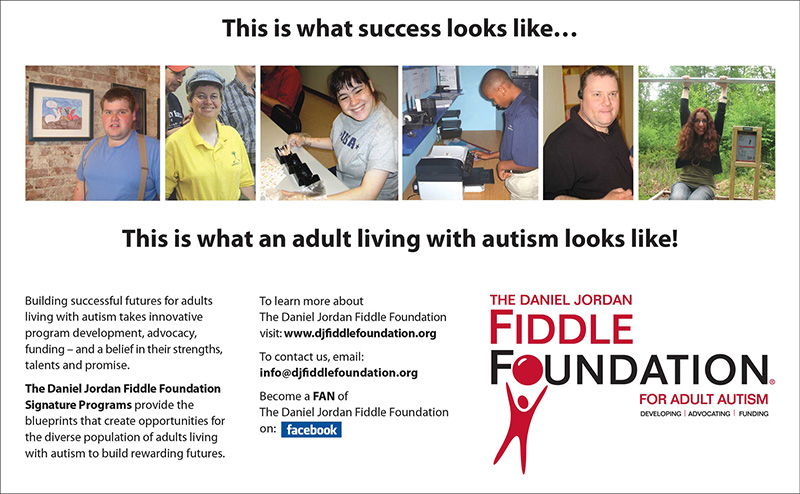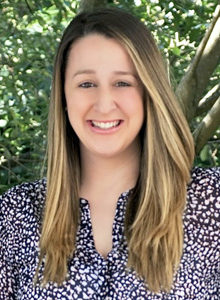The University of Miami-Nova Southeastern University Center for Autism and Related Disabilities (UM-NSU CARD), established by Florida statute in 1993, currently serves over 14,500 families in South Florida. Our program offers a variety of programs and services at no cost to our constituents and utilizes public and private partnerships in order to continue serving as a go-to resource for all those affected by autism and related disabilities. UM-NSU CARD could not effectively serve as many constituents as it has without support from our community partners.
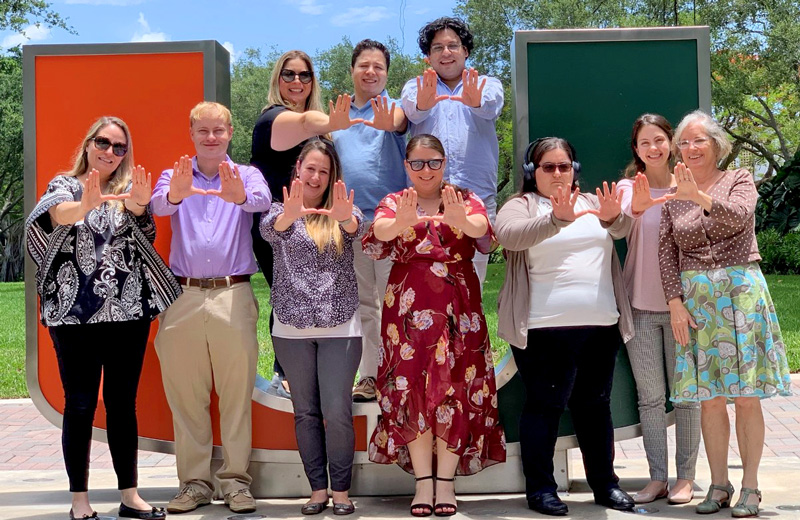
Job SEEKers participants celebrate the end of a successful employment training program at the University of Miami
UM-NSU CARD has had to grow along with its clients. As a significant portion of our clientele have moved into adulthood (nearly 50% are now over the age of 16), the UM-NSU CARD team has expanded its offerings to include uniquely tailored services and programs for teenagers and adults. These expanded offerings would not have been possible without the support of The Daniel Jordan Fiddle Foundation (DJFF), a national non-profit organization established in 2002 to focus on developing, funding, and advocating for suitable and sustainable programs, resources, support systems, and services that address the lifespan needs of adults living with autism. Linda Walder, the founder of the foundation, has a vision for a world that embraces our diverse population of adults on the autism spectrum and one in which those adults can have access to job opportunities that have been closed off to them for so long. By fostering access to jobs and community participation, adults on the spectrum can meaningfully contribute to community life and attain their maximum potential as individuals.
Employment rates for adults on the spectrum continue to be devastatingly low. Young adults with autism have been found to have lower employment rates than peers with other disabilities, including intellectual disabilities. For those who were employed, jobs were largely part-time with low wages (Roux et al., 2015). Employment rates for people with autism (regardless of intellectual functioning) range from 4.1 to 11.8% (Taylor & Seltzer, 2011). Adults with ASD with higher cognitive abilities are unlikely to be competitively employed, possibly due to fewer supports available to assist them. Adults on the spectrum face many challenges in the employment process, including navigating job applications, tailoring resumes and covers letters to the employers’ needs, implementing successful interview strategies, exhibiting the social skills considered necessary in the workplace, and making decisions about disclosure and requesting accommodations (Wilczynski, Trammel, & Clarke, 2013).
UM-NSU CARD and other organizations such as the DJFF cannot meaningfully impact the historical employment rates of adults on the autism spectrum without the participation of businesses and local communities at large. Successfully closing the employment gap requires two significant steps: (1) intensive employment readiness programming and training for adults on the spectrum and (2) the implementation of a strategic onboarding and ongoing support process by the businesses themselves that are tailored to the unique needs of their employees on the autism spectrum.
UM-NSU CARD’s Job SEEKers (Seeking and Enhancing Employment Knowledge) program was developed to tackle step 1. Job SEEKers is an intensive employment readiness program designed to prepare adults with ASD for competitive and meaningful employment. The program teaches many employment skills that do not come naturally to individuals with ASD and are skills that are never explicitly taught. These skills are necessary for an employee to understand workplace expectations and are therefore critical for ongoing, successful employment.
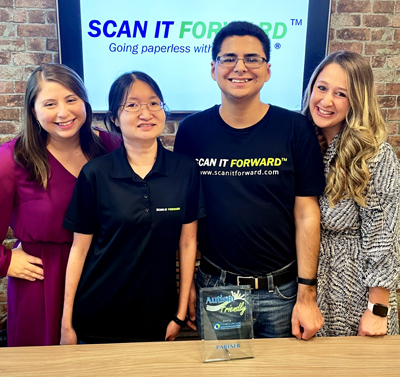
UM-NSU CARD Staff awards one of their newest Autism
Friendly Partners, Scan It Forward. Jose Roman and Alison Kong
are Job SEEKer graduates and the newest hire for their company.
The Job SEEKers program targets the following specific employment readiness skills: (1) drafting resumes; (2) disclosing your diagnosis (if/how); (3) dressing for success; (4) social skills for the workplace; (5) searching for jobs that match the individual’s unique skills and abilities; and (6) navigating the interview process. A recent Job SEEKers graduate, who recently celebrated his one-year anniversary of employment, shares:
“I really credit Job SEEKers for helping me get the job and keeping it. That really helped me with communication and interpersonal skills I think in both getting the job and on the job.”
For participants of Job SEEKers, graduation from the program is only the beginning of their journey. Once a participant completes the intensive program, UM NSU-CARD provides them with continuous monthly support through support groups and other programming. The employment support group (Job Club) is led by one of our UM NSU-CARD case managers and is comprised of adults either looking to gain employment or those looking for support in maintaining employment. The Job Club serves to provide continuous support and inspiration and to ensure that participants know they are never alone on their path to continued meaningful employment.
Adults with ASD have been significantly disadvantaged due to society’s failure to embrace and understand their unique perspectives and thought processes. Since neurodiverse individuals may communicate and behave in atypical ways, it is important for businesses to understand and embrace neurodiverse individuals and foster a workplace environment and culture where all employees are valued and can succeed.
To provide these opportunities, it is imperative to offer support through training, implementation of accommodations, and ongoing technical assistance to create a neurodiverse workplace, which leads to step 2. Now is the time. During the global pandemic, individuals have been leaving their jobs in droves. You cannot take in the news without hearing or reading phrases such as “The Great Resignation” or “The Employee Exodus.” You also cannot drive around without seeing “for hire signs” everywhere. Fortunately for business owners, autistic adults are ready to work and are naturally suited to many jobs. There are also numerous benefits to hiring employees with autism. People on the spectrum often demonstrate honesty, high tolerance for repetitive tasks, loyalty, strong memories, dependability, and adherence to rules. These are the very qualities employers so often desire, and yet, adults on the spectrum continue to struggle to find the right employment fit. The possibilities can be endless when an inclusive workforce is created through ongoing training and support.
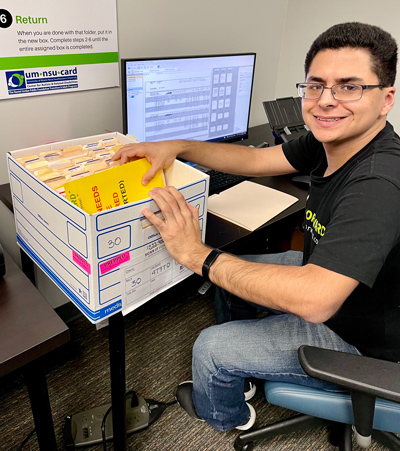
Jose Roman, co-author and Scan It Forward employee, is
excited to highlight his new role and demonstrate successful
employment when receiving the right accommodations and supports
Jose Roman, co-author and Job SEEKers’ graduate, has recently started working at Scan It Forward. Scan It Forward, a south Florida scanning business, was willing to open its doors to neurodiverse employees and recognized UM-NSU CARD as a valued partner. With UM-NSU CARD training, the development of individualized visual supports, and assistance with employee recruitment, Scan It Forward’s business began to soar while creating a safe and accommodating workspace for several autistic adults. Jose Roman has the following to share about his experience as a Scan It Forward employee and Job SEEKers graduate:
“As an autistic adult, I never thought I would feel welcomed and accepted in the workplace. I struggled for years and was never able to pass an interview or even get a callback. Thanks to UM-NSU CARD for the support provided to me through Job Club and Job SEEKers. Through these programs, I learned about the job search process and how to navigate employment. When UM-NSU CARD shared about the opportunity at Scan It Forward, I was excited and nervous but my experience for the first time was amazing! I enjoy scanning and get to do my work in a quiet workspace. I am also grateful to have visuals to help me complete my work. I love our staff lunches when we all get together. I love feeling like I belong and an impact at work.”
Neurodiverse workplaces not only provide meaningful opportunities for inclusivity, but they are also clearly good for business. Owners, Pierre Smith and Chanell Solace share, “Our margin of error went from 15% to 0.5% after hiring autistic employees. Our neurodiverse staff members have brought a unique perspective to the workplace, are never late, and have proven to be valuable and reliable staff.” With the right supports in place for our neurodiverse job seekers and our business partners, closing the employment gap for neurodiverse individuals has perhaps never been more achievable than this moment in our history.
Silvia Gil, MSEd, is Manager, The Daniel Jordan Fiddle Foundation for Transition and Adult Programs, University of Miami-Nova Southeastern University Center for Autism and Related Disabilities (UM-NSU CARD). Jose Roman and an autistic self-advocate, Job SEEKers graduate, and an employee at Scan IT Forward.
References
Roux, Anne M., Shattuck, Paul, T., Rast, Jessica E., Rava, Jullianna A., & Anderson, Kristy A. National Autism Indicators Report: Transition into Young Adulthood. Philadelphia, PA: Life Course Outcomes Program, A.J. Drexel Autism Institute, Drexel University, 2015.
Taylor, J.L. & Seltzer, M. M. (2011). Employment and post-secondary education activities for young adult with autism spectrum disorders during the transition to adulthood. Journal of Autism and Developmental Disorders, 41(5), 566-574.
Wilczynski, S.M., Trammell, B., & Clarke, L.S. (2013). Improving employment outcomes among adolescents and adults on the autism spectrum. Psychology in the Schools 50(9), 876-887. DOI: 10.1002/pits.201718

